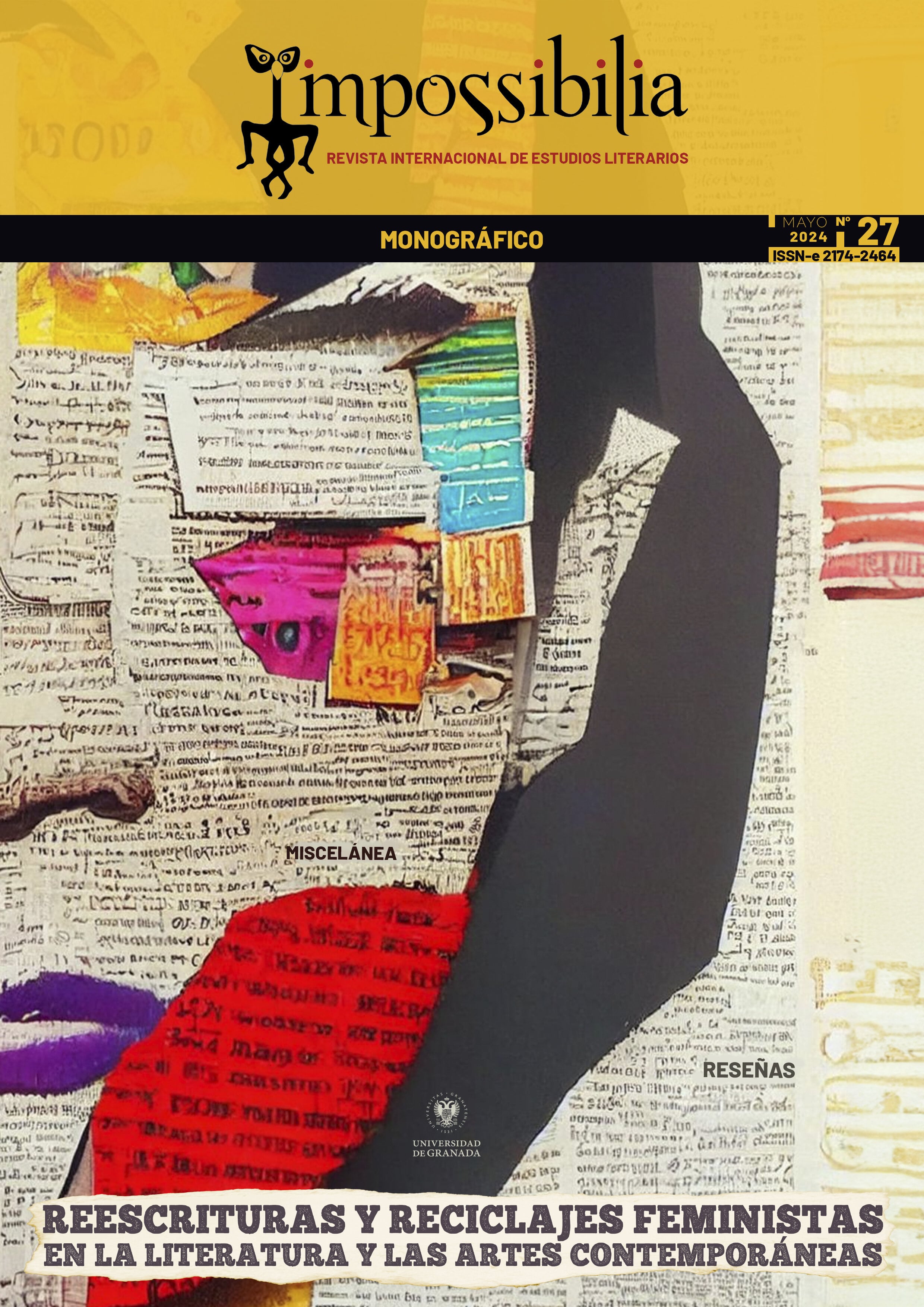Feminist Literary Recyclings in the Postdigital Age
DOI:
https://doi.org/10.30827/impossibilia.272024.29705Keywords:
Recycling, Postdigital, Electronic Literature, Feminism, Artificial IntelligenceAbstract
Assuming that we have already entered a postdigital condition, this signifies a transformation of both the communicative and organizational level of knowledge through digitalization, mass circulation, and datafication. Due to these shifts, cultural recycling has become a hegemonic trend. Moreover, recycling practices influenced by the traits of the postdigital condition are particularly suitable for modifying, subverting, and reshaping previous contents, treatments, and forms. In this context, the article shows through examples the evolution of women's work in the field of electronic art and literature, focusing on how the practices and phenomena of postdigital cultural recycling operate when developed from a feminist perspective.
Downloads
References
BERRY, David M.; & DIETE, Michael (eds.) (2015). Postdigital Aesthetics. Art, Computation and Design. London: Palgrave Macmillan.
BREE, Paco (2023). La transformación cultural y tecnologías exponenciales. Anuario AC/E 2023 de cultural digital. Focus: ¿Viajan los contenidos culturales digitales en español?, 25-39. Disponible en: https://www.accioncultural.es/es/anuario2023
COX, Geoff (2014). Prehistories of the Post-digital: Or, some Old Problems with Post-anything. APRJA, A Peer-Reviewed Journal About: POST-DIGITAL RESEARCH, (3)1, 70-75. https://doi.org/10.7146/aprja.v3i1.116087
CRAMER, Florian (2014). What is ‘Post-digital’? APRJA, A Peer-Reviewed Journal About: POST-DIGITAL RESEARCH, (3)1, 10-24. Disponible en: https://aprja.net/article/view/116068
FLORES, Leonardo (2019). Third Generation Electronic Literature. electronic book review, 7 de abril de 2019. https://doi.org/10.7273/axyj-3574
GARCÍA ARNAU, Albert (2015). De la música y su reproducibilidad mecánica: una aproximación sociológica, [Tesis Doctoral]. Madrid: Universidad Complutense de Madrid. Disponible en: https://eprints.ucm.es/id/
eprint/35633/1/T36805.pdf
GOICOECHEA DE JORGE, María; & SÁNCHEZ GÓMEZ, Laura (eds.). (2023). Voces encendidas: mujeres, arte y tecnología. Madrid: CSIC.
GUASCH, Ana M. (2016). El arte en la era de lo global, 1989-2015. Madrid: Alianza.
HARAWAY, Donna (1985). A Manifesto for Cyborgs: Science, Technology, and Socialist Feminism in the 1980s. Socialist Review, (80), 65-108.
HINE, Christine (2015). Ethnography for the Internet: Embedded, Embodied and Everyday. London, New York: Bloomsbury.
JENKINS, Henry (2006). Convergence Culture. Where Old and New Media Collide. New York, London: New York UP.
JORDAN, Spencer (2020). Postdigital Storytelling: Poetics, Praxis, Research. London, New York: Routledge.
KLUCINSKAS, Jean; & Moser, Walter (eds.) (2004). Esthétique et recyclages culturels. Explorations de la culture contemporaine. Ottawa: Presses de l’université d’Ottawa.
LLAMAS UBIETO, Miriam (2024). Postdigital Cultural Recycling. En LLAMAS UBIETO, Miriam ; & VOLLMEYER, Johanna (eds.), Cultural Recycling in the Postdigital Age (15-73). Lausanne: Peter Lang.
LÓPEZ FERNÁNDEZ-CAO, Marian (2017). Orfandad, bastardía y desherencia en la crítica del arte. La genealogía como legitimación patriarcal y exclusión femenina. M-Arte y Cultura Visual, Edición Especial 5 Años (2012-2017), 88-91.
MANOVICH, Lev (1999). Database as Symbolic Form. Convergence: The International Journal of Research into New Media Technologies, (5)2, 80-99. https://doi.org/10.1177/135485659900500206
MARTÍN PRADA, Juan (2017). Sobre el arte “post-Internet”. Revista Aureus, (3), 45–51. Disponible en : http://www.juanmartinprada.net/imagenes/martin_prada_sobre_el_arte_postinternet.pdf
MARTÍNEZ COLLADO, Ana (1999). Perspectivas feministas en el arte actual. [Conferencia en el ciclo Genealogías del arte contemporáneo: 1968-2000, coord. por Carles Guerra, Els juliols de la Universitat de Barcelona, julio de 1999. Disponible en: http://www.estudiosonline.net/texts/perspectivas.html
MAYAYO, Patricia (2014). Después de Genealogías feministas. Estrategias feministas de intervención en los museos y tareas pendientes. Investigaciones Feministas, 4, 25-37. https://doi.org/10.5209/rev_infe.2013.v4.41875
MILGRAM, Paul y TAKEMURA, Haruo; Utsumi, Akira y Kishino, Fumio (2004). Augmented reality: A class of displays on the reality-virtuality continuum. Proceedings of SPIE – The International Society for Optical Engineering, (2351), 282-292. DOI: 10.1117/12.197321
NAVA, Gwyneth (s.f.). The construction of the intertextual body that I found lying. Anti Materia. Disponible en: https://anti-materia.org/intertextual-body
NAVAS OCAÑA, Isabel; & ROMERO LÓPEZ, Dolores (eds.) (2023). Ciberfeminismos, tecnotextualidades y transgéneros. Literatura digital en español escrita por mujeres. Almería, Madrid: Universidad de Almería, Ediciones Complutense.
NIEBORG, David B.; & POELL, Thomas (2018). The platformization of cultural production: Theorizing the contingent cultural commodity. New Media & Society, 20(11) 4275-4292. https://doi.org/10.1177/1461444818769694
OLSON, Marisa (2011). Postinternet: Art After the Internet. Foam Magazine 29, 59-63.
SANZ, Amelia (2024). Predigital Narratives for a Postdigital World: The Case of Amélie Nothomb. En LLAMAS UBIETO, Miriam; & VOLLMEYER, Johanna (eds.). Cultural Recycling in the Postdigital Age (117-134). Lausanne: Peter Lang.
SAUM-PASCUAL, Alex (2023). El ensayo material: Sobre la práctica de una escritura digital [femenina]. En GOICOECHEA DE JORGE, María; & SÁNCHEZ GÓMEZ, Laura (eds.). Voces encendidas. Mujeres, arte y tecnología (209-230). Madrid: CSIC.
SCHÄFER, Mirko Tobias (2011). Bastard Culture!: How User Participation Transforms Cultural Production. Amsterdam: Amsterdam University Press.
STEYERL, Hito (2009). In Defense of the Poor Image. e-flux Journal, (10). Disponible en: https://www.e-flux.com/journal/10/61362/in-defense-of-the-poor-image/
WETZEL, Michael (2017). Medien. En KÜHNHARDT, Ludger; & MAYER, Tilman (Eds.). Bonner Enzyklopädie der Globalität (467-478). Wiesbaden: Springer VS Verlag.
ZAFRA, Remedios (2018). Redes y (Ciber) Feminismos. La revolución de la representación que derivó en alianza. Revista Dígitos, (4), 11-22.
ZAFRA, Remedios (2021). Three Decades of Art, Feminism and the Internet. En MARTÍN-PRADA, Juan (Ed.). Art, Images and Network Culture (55-83). Sevilla: Aula Magna-McGraw Hill.
ZUBOFF, Shoshana (2019). Surveillance Capitalism and the Challenge of Collective Action. New Labor Forum, (28)1, 10-29. https://doi.org/10.1177/
Published
How to Cite
Issue
Section
License
Copyright (c) 2024 Impossibilia. Revista Internacional de Estudios Literarios

This work is licensed under a Creative Commons Attribution-NonCommercial-NoDerivatives 4.0 International License.

You are free to share, copy and redistribute the material in any medium or format under the following terms: You must give appropriate credit, you may not use the material for commercial purposes and No Derivatives. Commits to respecting third party intellectual property rights.
Reception and proccesing of papers has no costs for authors.
Author assumes responsibility for the ideas contained in the article.
Papers must be original and must not have been published before and at the moment they are submitted, papers should not be in the process of evaluation by any other electronic or printed media.
The authors are allowed and recommended to publish their published work through the internet. It could produced interesting exchanges and increase the published work citation. (See El efecto del acceso abierto).




















